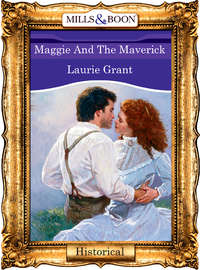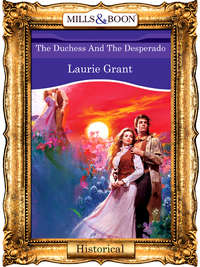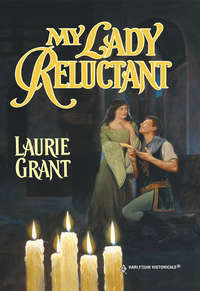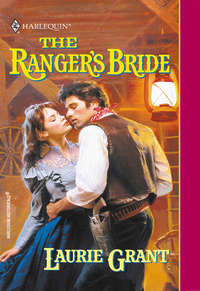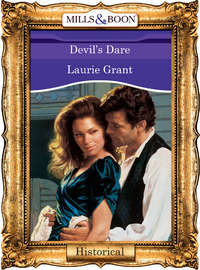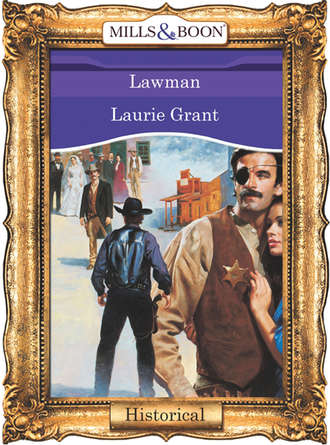
Полная версия
Lawman
“Olivia miscarried yesterday,” he said, rising. “Thanks for breakfast, Mama.”
Annie’s mouth dropped, then she clucked sympathetically. “She must have been in town and saw it all?” she guessed.
Cal didn’t bother to set her straight. His inquisitive sister didn’t need to know his role in the matter.
“I expect it was the excitement—the bank robbery and all,” she said knowingly. “Still, it’s probably for the best that she—”
“Goodbye, Mama, everyone,” said Cal firmly, reaching for his hat on the peg by the door. He did not want to discuss the matter any further. He’d spent too much of last night tossing on the lumpy mattress and wondering if Livy’s losing the baby was for the best or not.
“Now you be real careful, Caleb, you hear?” his mother added, just before he shut the door.
“I will, Mama. Don’t you worry,” he told her gently.
He arrived back in Gillespie Springs to find one of his jail cells occupied by a scared-looking lad perhaps ten years old, while an angry, balding man paced in front of the cell.
The man stopped pacing as Cal entered. “Oh, there you are, Sheriff Devlin. 1 took the liberty of arresting this young hooligan until you returned.”
“Oh? And what law did he break?” Cal inquired, studying the white-faced boy huddled on the cell’s cot. The boy stared back, looking more frightened than before as his eyes rested on the black eye patch Cal wore.
“I’m Fred Tyler, and I own the general store. I caught him red-handed, filchin’ the licorice sticks!”
Cal stepped over to the barred alcove, and the boy cringed. “What’s your name, son?”
“D-Davy. Davy Richardson,” the lad quavered, his eyes big as saucers as he gazed up at him. Cal knew he was frightened all the more by the patch and the scars on his face, and felt a rush of sympathy for the boy. But he steeled himself to remain impassive.
“We haven’t met, but I’m Sheriff Devlin,” he told • him. “You know how long a jail sentence a thief usually gets?”
The boy hung his head. “No, sir.”
“It’s about five years,” Cal announced, though he had no idea if this was true. “Did you take the licorice?”
The boy was silent.
“Ask him to stick out his tongue, and you’ll see what the little thief’s been up to,” Tyler suggested from behind him.
Cal felt a flash of irritation at the proprietor’s self-righteous tone, but he didn’t turn around. “Well?” he asked, raising an eyebrow.
The boy looked at him for a second, then defiantly stuck out his black tongue—at the storekeeper.
Cal had to struggle not to laugh. “I guess that’s all the proof I need. Davy Richardson,” he said in a stern voice, “I hereby sentence you to five years.”
The boy blanched still further and gulped. “Don’t I get a trial or nothin’? I’m sorry, really I am!”
Cal allowed his face to relax slightly and let himself appear to consider the question. “Nope, no trial. A black tongue is pretty much all the evidence I need to convict you in this case. But I’d consider commuting the sentence…”
“C-commuting? What does that mean?”
“That means I’ll change your sentence to sweeping out the general store, then the jail office here, and when you’ve done so, I’ll declare you’ve paid your debt to society.”
Tyler huffed, “He won’t stick around five minutes to sweep. You’re lettin’ him off too easy, Devlin.”
“Oh, yes he will,” Cal said with certainty. “You know what happens if you don’t finish the job, Davy?”
Davy shook his head warily.
“I’ll form a posse and hunt. you down, and then you’ll get ten years, in addition to the hidin’ your father’ll probably give you when he finds out.”
“I ain’t got no father. He’s dead,” the boy informed him matter-of-factly. “But don’t worry, I’ll finish the job. Now let me outa here—please?”
“All right,” Cal said, removing the keys from the desk with an appropriate flourish. He unlocked the cell, and the boy sprang out as if he’d been there five years already.
“Now hold up there,” Cal said, when the boy would have followed the proprietor out the door. “On your way over to the general store, drop this off at the saloon,” he said, handing him the dirty plate and silverware that had been there ever since yesterday, when Sheriff Watts had been eating what turned out to be his last meal. “Tell them the new sheriff is ready for his dinner whenever it’s convenient, please.”
“Yes, sir!”
Cal waited until the merchant had taken his leave before grinning with satisfaction. He’d just settled the first case of lawbreaking since his term as sheriff had begun. Then he began to go through the desk drawers, which were as messy as the old sheriffs room had been. He supposed he was going to have to hire a deputy, too, for times when he had a prisoner to guard and his duties took him elsewhere.
That task completed, he figured it would be a while before dinner would be delivered from the Last Chance Saloon. He had time to explore a little.
He knew the buildings on Main Street already—the bank, the jail, the doctor’s office, the general store, the livery stable, the Baptist church, the saloon, the hotel, the millinery, the bathhouse and barbershop, and at the far end, across from Livy’s house, Gillespie Springs Park.
He strode down the side street between the bank and the hotel and came to South Street, or so the painted sign proclaimed it. He had already learned that South Street was deemed the more desirable of Gillespie Springs’s two residential streets. The prosperous townspeople—the doctor, the owner of the general store, the mayor, the saloonkeeper and their like—lived in modest but well-built stone-and-frame houses there, the lots separated by picket fences, most of them freshly whitewashed.
At the west end of South Street, up on a little rise, stood an antebellum mansion of red brick on a lawn shaded by ancient live oaks. A brass plate on the black, wrought-iron fence that surrounded the grounds proclaimed that Robert Gillespie lived there. Behind the house stood a circle of frame cabins, which probably had been slave quarters before the war.
So this was Robert Gillespie’s place. He apparently hadn’t believed in sharing his wealth with his younger brother, Cal mused, for the house Livy lived in, while comfortable, was nothing like this.
Leaving the Gillespie mansion behind, he crossed behind the Baptist church and came to North Street, which ran parallel, behind the bathhouse-barbershop, saloon and jail. Here, directly behind the saloon, was the ramshackle row of rooms known as the cribs, where a quartet of whores entertained their customers. The rest of the houses were mostly rickety affairs, too, little better than tar-paper shacks with tin roofs.
North Street was where the employees of the hotel and the bank, and Gillespie Springs’s few immigrants lived, and Long had told him almost all of the humble dwellings were rented from Robert Gillespie. Here and there Cal saw chickens scratching among the weeds that grew alongside the houses, and behind one unpainted, straggling picket fence a fat pink sow lolled in the sunshine. Down the street, three boys were kicking a ball back and forth.
South and North Streets might have been in different worlds, Cal thought as he cut back up the side street that ran between the saloon and the jail. He was tempted to go down to check on Livy now, but he resolutely put it off till after dinner.
The sounds of Jovita’s humming drifted up the stairs to the bedroom, and Olivia smiled. God bless Cal for finding her for me, she thought, and after I spoke the way I did to him, too. How would she have ever managed alone? She still felt weak as a newborn colt. She could hear the plump, middle-aged Mexican woman down in the kitchen now, rattling pots as she cleaned and straightened. A delicious smell wafted up the stairs, caused by the simmering chicken broth Jovita had promised “Señora Gillespie” for dinner.
Just as soon as she regained her strength, Livy would have to apologize to Cal for the harsh way she’d spoken to him, and thank him for hiring Jovita for her—and for saving her life, too, of course! Well, since he was now the sheriff, it wouldn’t be too hard to encounter him casually in town.
Olivia supposed most women would be so overcome with embarrassment at the thought of a man other than their husband having seen them in the midst of such an intimate, female crisis that they would be unable to face that man again. But she had never been one for false modesty. To blush and turn away when a man had saved her life would be unforgivable, in Olivia’s estimation, particularly when it was doubtful anyone else would have lifted a finger to help her.
She’d thank him politely, and that would be that. As much as her heart had warmed at the sight of him, she must not let on.
Cal Devlin had suffered enough in this life, she thought, remembering how he’d been listed as missing in action in the middle of the war, and later given up for dead by his family. Then, just recently, she’d overheard the gossip that he’d been found in Abilene, and was returning home.
It had been a shock, discovering that the bruised, beaten man lying unconscious in the dust at her feet in Bryan was none other than Cal Devlin, but while she and his brother transported him home in her buckboard, pulled by the horse she’d rented from the livery, Sam had filled in the gaps in the story. She’d learned about Cal losing his memory along with the sight in his right eye during the war.
Olivia had grieved inwardly, thinking how hard it must be to come home scarred and maimed, and find such hatred and intolerance in the very town where he’d once been so loved and respected.
When Cal had told her in the doctor’s office that he was now the sheriff, Olivia had heard the reborn pride in his voice even through her laudanum-induced fog. And Jovita, who had gone into town early this morning to purchase a few things from the general store, had returned with the full account of what had taken place outside the bank yesterday. The good folk of Gillespie Springs were apparently quite pleased with their new sheriff.
Which was precisely why he must not associate with her. The very last thing the new sheriff needed, if he was to continue to have the support of the townspeople of Gillespie Springs, was a friendship with the infamous Olivia Gillespie, whom everyone knew had driven her husband to suicide by her infidelity.
She was not going to cry about that again, she vowed, staring out the window at the sunshine stealing through her window. It was a warm day for early November, so Jovita had left the window open a couple of inches. Olivia tried to concentrate on the antics of a squirrel cavorting in the branches of the cottonwood tree, clearly visible from where she lay, but it was no good.
“Whore! You took the very last thing I had left to me, didn’t you? You took my pride, and gave it to that greaser when you lay down for him! And now you tell me you’re gonna have a baby, and you expect me to listen to some crazy tale of some man rapin’ you in the barn! I’m no fool, you lyin’ slut! Bob’s been tellin’ me about you and that Luna, an’ how y’all been lookin’ at one ‘nother…”
“But Dan, you have to believe me!” she pleaded. “Francisco didn’t touch me, I swear to you! It was—”
” ‘Francisco’? Well, I guess you would be on a firstname basis with your Mex lover!” Dan roared, and swung his fist, catching her squarely in the side of her head
Everything had gone black, and when she awoke, it was to the news that Dan had killed Francisco Luna and then turned the gun on himself The sheriff’s disgusted face had frightened her—and then he’d read her the note Dan had left, in which Dan had explained that he had killed his wife’s lover, the father of the baby she carried, and intended next to shoot himself.
Her reason for silence—the need to protect Dan from the truth—was gone, but the sheriff hadn’t wanted to hear her side of the story. Neither had anyone else. Her brother-in-law, Robert, had seen to it that the contents of the note had been circulated about town, and before her husband had even been buried, Olivia had found herself an outcast.
Cal was already an outcast in Bryan; it must not happen to him here, too, not when he’d just gained a chance to build a life for himself. But it would happen if he was known to be friendly with Olivia Gillespie. She would be appreciative of the help he’d given her, but that was all; she’d nip in the bud any further attempts at friendship.
But perhaps it was assuming too much on her part to even imagine he’d want to be her friend, especially when he thought she was the one who’d been putting roses on Francisco’s grave…
All at once she heard the sound of footsteps on the porch below and then a firm knock at the door. She heard Jovita’s humming cease, and the creak of the boards as the Mexican woman went to the door. Then, a moment later, Jovita’s voice. “Buenos tardes, Senor Devleen! Yes, the senora ees much better today! Yes, I am sure she would welcome a visitor. Come een! I’ll just go up and see eef she ees awake first!”
It was surprising how fast a woman of Jovita’s plumpness could move when she was excited. “Senora! Eet ees—”
“Yes, I heard,” Olivia interrupted. “Tell him I’m asleep, won’t you? I’m in no condition to receive callers, Jovita,” she protested, her gesture indicating her nightgown, her hair loose on her pillow, the fact that she was in bed.
But Jovita wouldn’t listen. “Nonsense, senora. Thees ees the man who helped you, no? He looks so anxious— just let heem see you are better, yes?” Before Olivia knew what she was about, Jovita had found and draped a lacy shawl about her shoulders, combed her hair and set the room to rights. A minute later, Cal was entering the bedroom.
He was so tall he had to duck to avoid hitting his head on the lintel. For a moment he just stood there holding his hat in his hands, his presence filling the room as he studied her.
“I—I hope I’m not intrudin’ at a time when you’re not feelin’ very well, Livy,” he began, stroking the brim of his hat self-consciously. “But after yesterday I thought I’d better come see how you were doin’…”
Could he hear the way her heart was pounding? “That was very kind of you, Cal,” she said, being careful to keep her voice coolly polite. “As you can see, I’m much better. Thanks to you.”
He looked down at his boots. “Anyone would have done the same.”
No, they wouldn’t have, she thought, but did not say so.
“I’m glad you’re feeling better,” he said. His eyes returned to hers. “You, uh, you have a mite more color in your face than you had yesterday.”
His observation caused even more blood to come rushing up her neck and into her cheeks, heating them. “Yes, I feel better…Still weak, of course, but I guess that’s to be expected.”
He nodded, still gazing at her in his direct way.
What more was there to say?
“I—I like the mustache,” she said at last, idiotically, when the silence seemed to stretch on uncomfortably. “It looks dashing,” she told him, and meant it.
He gazed at her as if he thought she was loco. “Dashing?” he said with a short, disbelieving laugh, and made a gesture that indicated the scarred right side of his face as he shook his head.
“Yes, dashing,” she insisted, her heart twisting as she realized he thought the scars and the patch had made him ugly.
She was ambivalent about asking him to sit down, afraid he would misinterpret it, that he would think she wanted him to stay. But no, he would be right. She did want him to stay—she just couldn’t let him know that.
It seemed rude to keep him standing, though. “Please, won’t you sit down?” she said, motioning toward the chair beyond the small bedside table.
He looked uncertain. “I—I shouldn’t…can’t stay but a minute…” He sat down, nevertheless.
“Jovita tells me you’re quite the town hero,” she said breezily. “They can’t praise you highly enough, after yesterday.”
He smiled, and his face lost a little of its tenseness. “I just happened to be in the right place at the right time, that’s all.”
“So modest,” she teased. “I never knew you were such an expert marksman.”
His face grew somber again. “I wish I could do it over again, Livy. Two men are dead because of me. I should have just wounded them, so they could have been captured.”
His anguished face caught at her heart. “You mustn’t blame yourself for their deaths, Cal. One of them murdered our sheriff. The other one could have killed you— I hear he shot at you, but missed. You did what you had to do.”
He looked away. “I know…but I just keep thinkin’ about how I might’ve done it differently…if I’d taken time to think. But I was so angry at seem’ that old man gunned down—he was just tryin’ to do his job…”
That was what Olin Watts had said to her, Olivia thought, after he’d read her Dan’s suicide note. I’m just doin’ my job, Miz Gillespie. But that had nothing to do with the event that was tormenting Cat’s soul now, so she resolutely pushed it aside.
“Look at it this way, Cal. If the robbers had been captured instead, probably both of them would have been hanged for killing the sheriff and for the bank robbery. I’d wager they would rather have died quickly, the way they did, instead of at the end of a rope.”
“I suppose you’re right,” he said, but his expression remained bleak.
“You’ll be a good sheriff,” she assured him. “Gillespie Springs is lucky you came along.” But how was she going to stay away from him if he lived in the same town? They’d never managed to stay away from each other when they’d been growing up, when her family’s plantation and the horse farm he’d been raised on had been so temptingly close. She couldn’t count the number of times she’d awakened to the rattle of pebbles on her window and had gone out to meet him in the moonlight. They’d never done anything that might have ended in disgrace, but they’d come close sometimes…
He sighed. “I hope so. I’d like to be able to uphold the law here without killing anyone ever again. I’m going to try not to, anyway.”
“I know if there’s a way you can avoid it, you will,” Olivia said. “But you be careful, won’t you?” She hoped he wasn’t going to be so wary of drawing his gun again that he’d be an easy target for the next troublemaker that came through.
His face lightened. “Don’t worry, Livy, I will. Well…maybe I’d better be goin’. I don’t want to tire you out.” He glanced at the sheet she had pulled up to cover most of her shoulders. “Would it be okay if I came back when you were feeling better—when you’re up and around?”
Now was the time, she knew. This was when she had to end it.
She took a deep breath and forced herself to meet his gaze. “That won’t be necessary, Cal,” she said, keeping her tone brisk. “I’m sure you’ll have a great many things to do, settling in as the sheriff, and I—”
He stiffened. “I know it isn’t ‘necessary,’ Livy,” he said, his face taking on a wary look. “I asked if I could come back because I wanted to.”
She couldn’t look at him any longer. She couldn’t tell him the truth, for she knew Cal, knew him to be chivalrous to a fault. If he thought she was refusing to see him for his own good, he’d be that much more determined to come.
“Cal, I appreciate all you’ve done, and I thank you, but I think perhaps that better be the end of it,” she said. “We’ve each done the other a favor. Perhaps we should just leave it at that.”
His face seemed suddenly set in stone. “So now we’re even, is that it?”
She looked away, unable to meet his eye. “I don’t mean to be unkind. It’s just that…well, I’m a widow, after all. It hasn’t even been that long, you know.”
“Somehow I don’t think that’s the reason.”
Oh, Lord, why was he making it so hard to do the right thing, to send him away for his own good?
She took a deep breath. “Very well,” she said, “you want the truth, and that is that I’ve learned to live without depending on a man, and I find I like it that way.”
Chapter Six
If her words hurt him, it was difficult to tell. The only change she could detect in Cal was a certain stillness, as if he were bracing for the next blow. She waited, her face turned away from him, listening for the sounds of his boot heels thudding down the steps.
The chair creaked, but the only other sound she heard was his intake of breath. She turned back to see him standing by the chair.
“Livy, I…maybe you’re readin’ somethin’ I didn’t mean into my wantin’ to visit. I know you’re recently, uh, bereaved. I—I didn’t mean…”
She looked away again. “Oh, I think you did. But don’t worry about it, Sheriff. I’m used to men assuming too much about me. They assume that since I had a Mexican lover, I’m fair game for any man. Well, I’m not.”
“Now it’s you who’s assuming, Mrs. Gillespie,” he said, his voice cold as a Texas norther. “I wouldn’t dream of interfering with your mourning, no matter who it is you’re mourning for.”
A second later, she heard the door close and the sound of his boots retreating down the steps.
I wouldn’t dream of interfering with your mourning, no matter who it is you‘re mourning for.
Oh, Lord, she had gotten carried away in her defiant pose, and it had succeeded too well. The way she had worded it, it sounded as if she were admitting that the stories about Francisco and her were true. Now Cal believed the gossip—if he hadn’t already—and he would despise her for being a treacherous, faithless woman.
It was for the best, she told herself, even as she sank back into the pillows, scalding tears flooding her eyes.
Cal marched back down the road into the heart of town, head erect, but not really seeing anything or anyone he passed. Her words still stung. How could Livy, the woman who had been his sweetheart years ago, praise him as a hero and compliment his mustache, then turn on him again? As if she hated him, as if she suspected him of—of assuming she was a woman of easy virtue, and wanting to sample her favors!
He hadn’t given much credence to the story of the supposed Mexican lover, until he’d found her standing by his rose-decorated grave. And now she had come right out and admitted it was true! They assume that since I had a Mexican lover, I’m fair game for any man…
Then he thought about what she’d said last—I’ve learned to live without depending on a man, and I find I like it that way…
Well, that was just fine. He was going to be busy being the best sheriff Gillespie Springs ever had. He wasn’t going to have time to be paying courtesy calls on an ill-tempered widow, even if she didn’t have any other friends. She’d made her choice. He’d found Jovita for her, so she wouldn’t be alone and helpless while she regained her strength.
Now, come on, Cal, tell the truth, at least to yourself. Could he honestly say there wasn’t a shred of truth in her accusations? Could he put a hand on his worn, wellthumbed Bible and say he didn’t still want her, that somewhere deep inside he hadn’t been hoping that after a decent interval, she and he might begin again what his going off to war had ended?
No, he couldn’t, but as God was his witness, he hadn’t intended anything dishonorable, anything that would hurt her. But she hadn’t hesitated to hurt him— again.
He let himself remember that other time, back in 1861, when he’d ridden over to Childress Hall, her father’s cotton plantation, to tell her of his decision and to ask her to wait for him.
She’d been wearing a dress of some sort of flimsy, light blue material sprigged with dark blue flowers, over a hoopskirt that swayed when she’d walked across the veranda to meet him, giving him glimpses of her lacetrimmed pantalettes and neat ankles above kid slippers.


